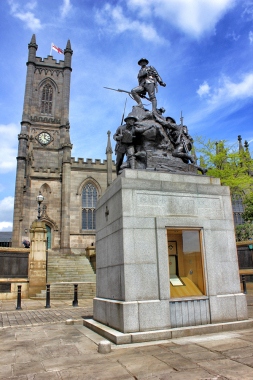Jim McMahon MP: Remembrance Sunday and supporting our veterans
Date published: 10 November 2017

Photo: Oldham Council
Oldham War Memorial
It’s absolutely right that we take time this weekend to remember those who have died in recent wars. It should be a time for our country to acknowledge the sacrifices made for our freedom in a dignified and unified manner.
We have a proud history of doing so: From the war memorials up and down our country; to the World War One centenary events that continue to mark that dark episode in our history.
Parliament plays its part in remembrance, too. This year we reflected on 100 years since the Battle of Passchendaele – one of the bloodiest battles of the First World War.
One of my proudest achievements as Leader of Oldham Council was restoring the war memorial in the town centre. It is one of the first places I take visitors to our town. I am keen to show that Oldham remembers the contribution our towns have made in the past 100 years.
Tributes to the war-dead must also extend beyond our servicemen and women fighting on the frontline. It is only right that we better understand, and remember, the civilian lives lost in wars – either helplessly caught in conflict zones, or purposefully targeted.
On top of this, we mustn’t forget those who return from war and tours of duty. Many may adapt back to civilian life and move on from their experiences. But too many carry wounds of some kind, or struggle to fit-in to ‘normal’ life outside the armed forces. Some wounds may not be physical. In recent decades there has rightly been a much better understanding of the effects of post-traumatic-stress on soldiers and their families.
The Armed Forces Covenant was a big step towards society working together to better support our veterans. The Covenant is a promise from the nation that veterans and their families will be treated fairly and helped wherever possible. It is something that we should all pledge as individuals, but is especially for councils, businesses, charities and community organisations.
Published in 2011, the Covenant is a way of making sure that no veteran or their family is at a disadvantage in society, and pledges special consideration for some cases in receiving public services.
This is only right, as there are strong links to poor housing and job insecurity for veterans leaving the armed forces.
Despite this, there is more that can be done. There is still too high a chance that if you leave the armed forces, you are likely to face homelessness. With that experience can come a spiral of problems: from substance abuse, to debt, and family break-up.
The solution involves both making sure support is in place for personnel leaving the armed forces, for example job training and coaching. But there are also structural challenges that we must work together to resolve – such as the supply of suitable housing, and access to benefits.
I am acutely aware of this challenge, and as an MP I take to heart my work of giving a voice to veterans in Parliament. More-so because as Shadow Local Government Minister I am tasked with holding the government to account over how they help local councils to help the most vulnerable in our society.
Most Viewed News Stories
- 1Group wanted following attempted robbery incident on a tram in Shaw
- 2Oldham dealer jailed after using drugs line mobile phone to call police
- 3Shaw prospect Rafferty aims to shine at massive 'Ring Warriors Unleashed' show
- 4Punch perfect Kyle is Oldham's latest national boxing champ
- 5Milan Bar in Lees and The Bank at Delph close doors with immediate effect




